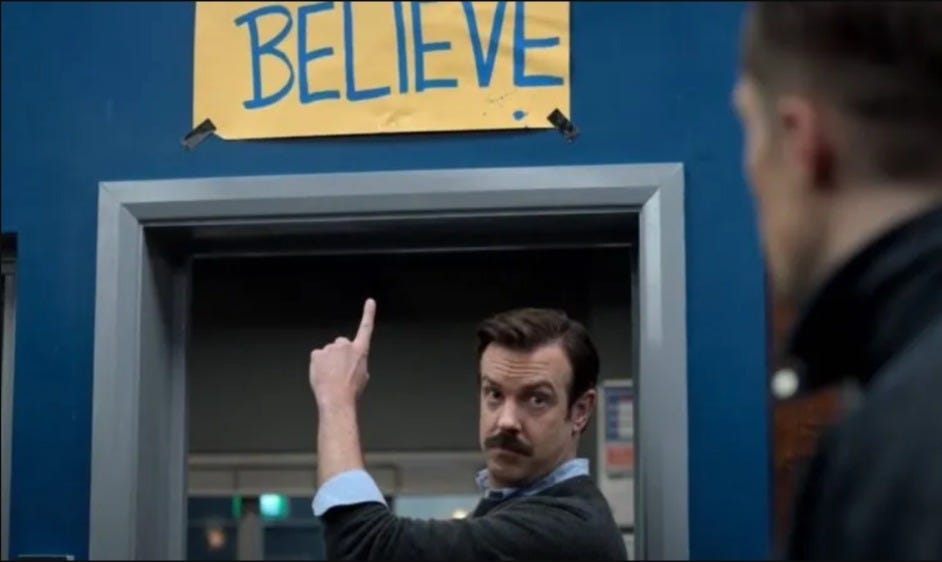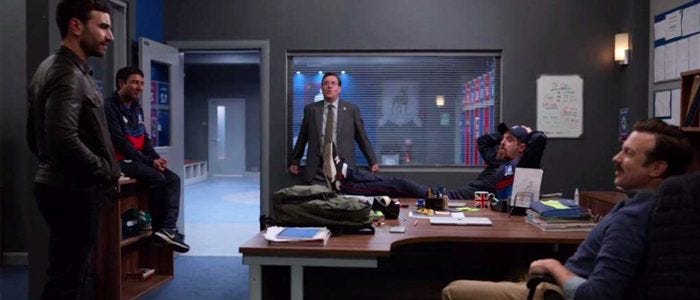Cultivating Belief, Putting out Fires, and Selling Chocolate Milk: Interview with Slate Milk Co-Founder, Josh Belinsky
This week’s interview is with Josh Belinsky, co-founder of Slate Milk, a better-for-you protein drink brand known for creating unique ultra-filtered milk products that have high protein content, 0 grams of added sugar, are lactose-free, and have 100% plastic-neutral packaging.
Josh and his cofounder, Manny Lubin, had the idea for Slate when they met as college students at Northeastern University. Many hours of googling later, they made the decision to go full-time on the business after graduation and spent the next 18 months self-funding the operation as they worked to bring a product to market. Six years later they’re still at it…and not remotely done yet. Since the official launch in late 2019, Slate has sold over 20 million cans, expanded to be sold in over 15,000+ different doors across the country, and have even become an official marketing partner of UFC.
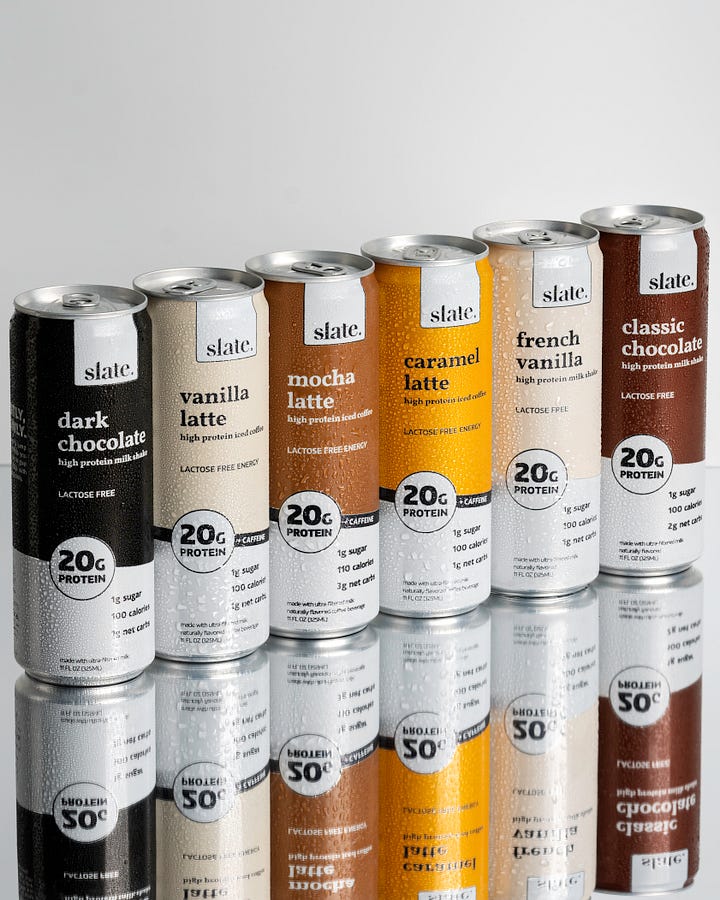
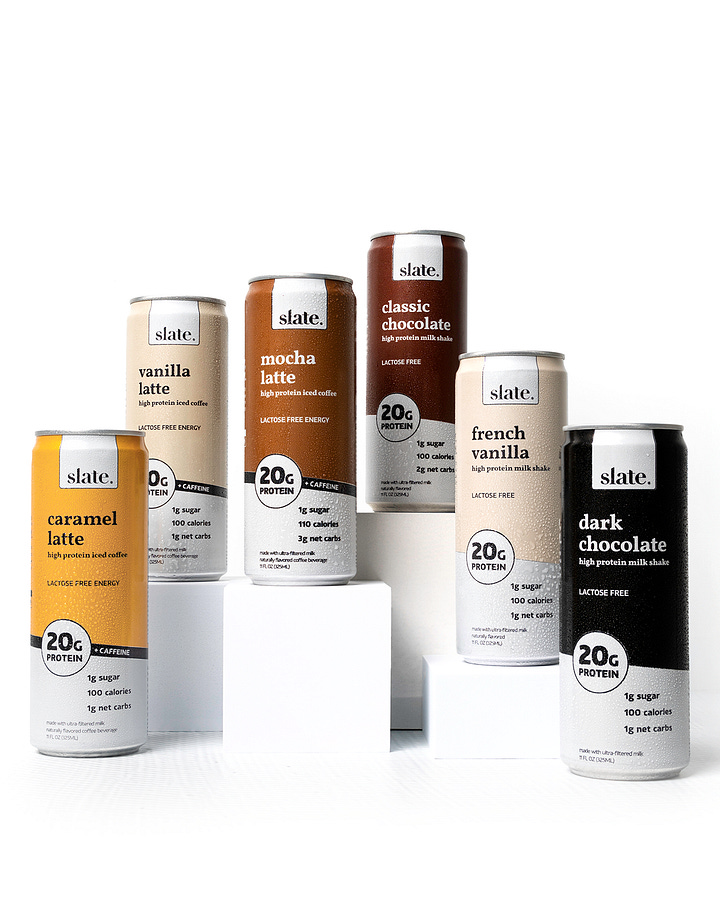
In the interview, Josh and I spoke about:
What kept him and Manny going during those 18 months before they had a product to launch
Getting started, constantly iterating, and why “grand plans” are BS
How he works to keep ego out of decision-making
Learning when to buck conventional wisdom
Prioritizing things that help him do his best work (hint: not cold plunges)
Being in the “fix it later” phase of business building
Note: The following interview has been lightly edited for clarity and length. While every effort has been made to preserve the integrity of the conversation, please be aware that the quotes may not be verbatim but reflect the essence of the dialogue.
What’s the most honest way you would describe your occupation?
When we first started, I would almost avoid the question when I was introduced to someone or someone asked me what I did for work. I’d say, “I’m in the food and beverage business” or “I sell chocolate milk.”
The more honest way is how I describe it when I do something like go back and give a talk at Northeastern. I put two Ted Lasso reference photos up on the board.
The first one is Ted holding up the “BELIEVE” sign. I tell the students that your job as a founder is to constantly be convincing people to believe in you, your product, your brand, and your vision, and therefore convincing people to do things like take less salary with equity upside or a retailer to give you shelf space from a major brand. Sometimes, it’s convincing your parents or your significant other that you're not crazy, as well as, more importantly, convincing yourself.
The second is about the diamond dogs, who come together in the show to talk through and solve problems. Your other job as a founder is to put out fires at all times. You are the last line of defense.
If I had to be more tangible in what I actually do, I’ll say this. As the years have gone on, my cofounder and my jobs have changed. In the early days you’re just trying to create the foundation of the product, brand, team, etc. As time goes on and the business grows I’m not only continually improving on the foundation, but the business starts to require that certain processes are put in place, and that Manny and I are strategically planning for the future and, not just in the day to day, but 100% of the time.
I read that it took 18 months to actually bring a physical product to market and you two funded everything up until that point. Is that right?
We had the idea in October 2017, went full-time in October 2018, and then launched in the fall of 2019. So that’s two full years from idea to launch. When we went full-time in 2018, we quit our jobs and didn’t have any steady income, so I caddied on the weekends and Manny did some coaching of youth sports on the side.
One thing I often see in my coaching is that people mentally anchor to a timeline that is often far shorter than the amount of time it takes to get a business off the ground. Even a few months of no income can start to make you really nervous and start having doubts. What kept you two going during those first 18 months?
First and foremost for me was having a great co-founder. I tell people all the time that I don’t know how people do it as a solo founder. Shit's hard. It's isolating. It can be lonely. Most people think you’re crazy for taking this risk, so having someone else in that fight with you is huge. Your cofounder is the only person who has the true lived experience of doing exactly what you’re doing every day. I also think it’s validating to know that somebody else is still pushing this thing forward. Where, if it's just you, it can be easier to constantly ask: Is this a good idea?
The other thing that I want to make sure I mention is that you often hear speakers, podcasters, etc talk about how anyone can be an entrepreneur. What I don’t think they consider is how your life circumstances play a major role. For Manny and I, we didn't have kids. We didn't have a house. We didn't have a mortgage. We were both living with significant others at the time who supported us. And we worked during high school and college to put some savings away. But even more so, we both have very super supportive families. If either of us really fell on our asses after two years, we knew worst case we could always live with our parents and start over. Not ideal, not the goal, but we were much more willing to take that risk because of the support we had, which we fully recognize a lot of people don’t.
Another major component was having a co-founder to rely on. I always say I have no idea how solo founders do it. Each day, Manny and I’s goal was to move the business 1% forward. We actually had a whiteboard in the living room of his apartment, and it had 16 squares on it for every major category of the business. Things like HR, legal, fundraising, and product formulation with sub-bullets of action items beneath them. By the time we were ready to launch, we felt like we had most of our ducks in a row and learned more about the chemistry of milk than we ever thought we would. We think that time was actually a blessing, forcing us to study the product and the market before launching.
One thing I encounter a lot in my coaching is what I call the “myth of the grand plan.” A lot of people think that when you start a business you have an idea and come up with a “grand plan” that details exactly what the product will be and how you’re going to build the business and then you get started building. I have never found that to be the case, and it sounds like you haven’t either! Even though you and Manny had an initial idea around milk, you spent a lot of time figuring out the formulation and understanding exactly what problem you would be solving, which involved a lot of asking questions, googling, and talking to people. What’s your take on the “myth of the grand plan?”
I think the grand plan is BS. In my opinion, over the past 15 years, with things like Shark Tank and the popularization of entrepreneurship, entrepreneurs have become the rock stars of our generation. I think that people see the end without actually thinking about the beginning and the absolute grind of 100 hour work weeks. What’s crazy is how many of the richest people in the world literally sell doorknobs. Not groundbreaking software or the most innovative X. They are not Elon Musk. We love unsexy industries, because they are usually overlooked, which is prime for innovation.
People ask me all the time, “How did you even start the business?” I’m like, “google.” It wasn't like we were sitting around a table being like, “How can we get rich?” or “How do we create the next X?” We loved building and creating things, and we talked about how our skill sets would pair nicely together in a potential business. We were joking about how we're both lactose intolerant, but love chocolate milk, and we hated drinking lactose free milk brands that shouted to the world you were the kid with tummy issues. So the initial idea was to create a sleek branded, better-for-you, lactose-free chocolate milk. But what we’ve learned through market feedback is that the majority of our consumers are drinking our product because it provides them with protein and tastes really freaking good.

I read an interview where you spoke about what you learned from the experience of “getting roasted by the sharks” on Shark Tank. You said that you and your cofounder learned that there are going to be experiences that are “great for the brand but tough on the ego.” It’s easier said than done to not act in a way that is all about protecting your ego. What helps you not let things like fear or protecting your ego impact your leadership, decision-making, and how you run the business?
It's hard. I think everybody has an ego, no matter what they say. But I do think that my co-founder, Manny, and I keep each other in check. I also think our employees keep us in check. And I believe that we’ve created a culture where employees feel comfortable holding each other accountable.
In regards to not letting fear get in the way, when Manny and I are trying to decide something, and are stuck, we ask ourselves: What would we regret less? And above all, make sure we avoid one of the biggest things we see in entrepreneurs: analysis paralysis. I believe most of your job as an entrepreneur is measured on how you react to what happens, not necessarily what decision you make in the first place. We’d rather make a decision, go, and not look back. We do learn from what we did wrong, but we don’t spend a lot of time thinking about the past. We've made a ton of mistakes. We've done a lot of dumb stuff. But, again, I think we’re measured more by how we react to things. If something goes wrong, we fix it. I think learning to make decisions that way has taken a lot of the ego out of it.
When you run a business, there is no shortage of opinions, advice, articles, books, and podcasts on how you should be running things. Where have you learned to buck conventional wisdom and do things in a way that works for you, your co-founder, and the unique business that is Slate?
One of the major ones, which is unbelievably specific to our category in the beverage world, is around distribution. There are multiple ways to distribute a product to a grocery store. Traditionally, because beverages turn so fast, many beverage companies have used direct store distribution networks or DSDs. The thinking has traditionally been, no matter what, if you're going to win as a beverage company, you have to utilize DSD networks. Early on, we had many investors and even some industry veterans that told us we would never be able to compete without DSD. However, based on conversations with some other trusted people in the industry and store managers that we were visiting, we didn’t believe Slate needed to be. We built our business on a direct/wholesale model, and we are outselling most of our DSD competitors. Doing it this way has allowed us to be more capital-efficient. We try to be students of the game as much as we can, and then have really strong opinions on what we learn.
Another thing that’s not so unique anymore is being fully remote. We started in late 2019 with a really small office. After Covid broke out in March of 2020, we went fully remote and have continued to build that way ever since. We'll never force anybody to go anywhere. If you get your shit done, I don't care where you are. I totally understand the value of being in person, and we try to get together as much as we can. But we’re not going to mandate it. We continue to pull talent from all over the country by being remote.
As crazy as it sounds now, being capital-efficient was not conventional wisdom in the beverage world not too long ago. The thinking was that small companies couldn’t afford to be capital-efficient in the beverage industry and instead needed to raise lots of money and put up crazy growth and revenue numbers to attract the attention of major acquirers. I think there are probably a lot of companies now that regret following that wisdom, but even choosing to be capital-efficient when you did, was going against the grain.
That's very true. We've always understood that we need to grow, and it's okay to lose money upfront, but we have to have a plan within a shorter time window than what was previously considered “standard” to be profitable. If we are successful enough to get acquisition offers some day, we want the ability to sell or keep going, not be forced to take an offer because we’ll run out of money without it.
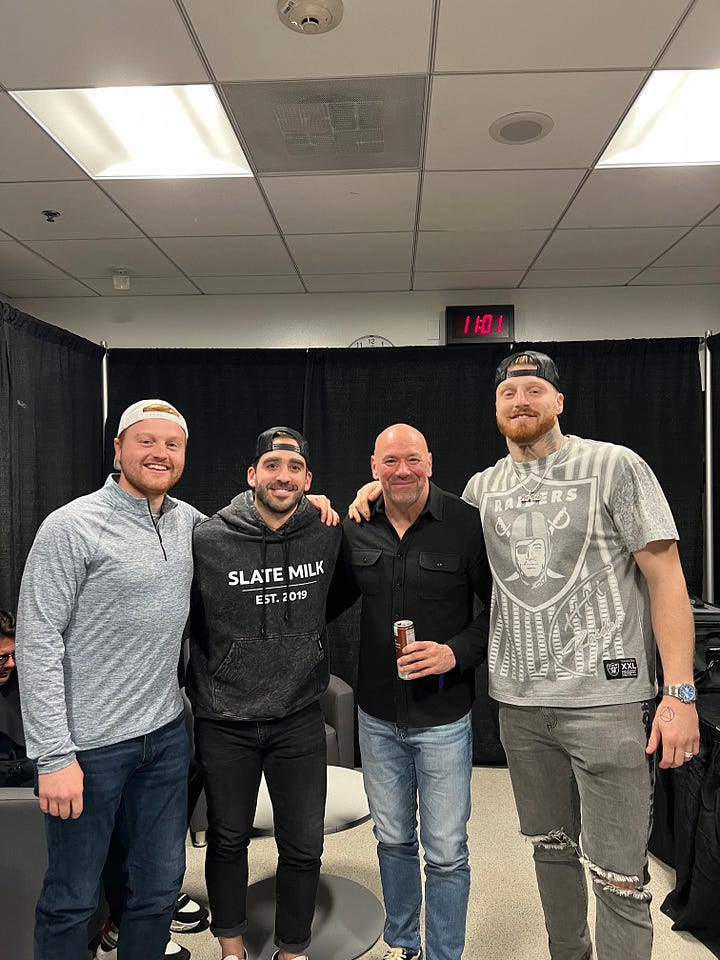

On days when it feels like things are in crisis or it feels like “everything sucks,” what helps you make a shift and get through those moments?
I'd like to say I just unplug and don't think about it, but that's bullshit. A big piece of it is my wife. We’ve been together since the beginning of 2017 so she’s been by my side through the whole ride. I lean on her a lot, and she does a great job of getting me out of the house for trivia on Tuesdays, having phoneless dinners, or playing a board game before bed. Anything that’s not sitting in front of my laptop. Another big help is how strong Manny and I’s relationship is. We pretty much talk through everything, including being on the phone until 11:00 at night a lot of the time, much to my wife’s dismay. And finally, having a supportive family that also lives close by, has been a great way to have a change of scenery and play pickleball or golf.
We’ve also raised money purposely from people in the industry and generally have a lot of other friends in the industry. People like Peter from RXBAR, Doug from Halo Top, Ron from ONE Bar, and Amanda and Drew from Yasso to name a few. They are all investors and have been through most of the things we’re going through. So when we have a problem, we figure out who the best person is to help us solve it and make a call. We call that our personal board of directors. Even outside of business, when I have a life problem, I have a couple of folks that I know I can go to. I always encourage people, whether it's in business or their personal lives, to build that board of advisors for themselves. You have to have those go-to people because life's hard, and you are typically not the first person to go through that problem.
One thing I work with a lot of clients on is helping them figure out what helps them as unique individuals do their best work. What habits or choices have you noticed actually help you do your best work?
First and foremost, I absolutely love what I do. I'm excited to get up every morning no matter what, whether it's chasing a cool opportunity, or things are working against us, and we need to fight. I think that if I didn't love what I did then I shouldn't be doing it, at least in terms of owning my own business. I know that not everyone has that privilege. I think it was important to choose a product in an industry that I was really excited about. I've had friends start companies for things that will never affect their lives, and I just can't imagine doing something so difficult and time consuming if you’re not individually passionate about it. The satisfaction of walking down the street and seeing somebody actually drinking our product will never get old. My friends and family send me pictures anytime they come across someone drinking our product, and I still think it’s the greatest thing in the world.
Outside of that, I’d again say enjoying time with my friends and family. Most of my family lives within a 30-minute drive from me. We go golfing together, play games, cookout, whatever. It really doesn’t matter - just having ways to enjoy life outside of work has been good for me.
Habit-wise I'm really not one of those people that's trying to implement the 4-hour work week or gets up and does 20 minutes of breathing or cold plunges. Not that there’s anything wrong with any of those things. Honestly, from what people say, I feel like I should, as it’d probably be good for me.
I think that’s a good point though. Those are things you feel like you should do because other people are doing them, but it doesn’t sound like those things are part of your personal recipe.
Not currently, no! But 100% to each their own! Whatever works I’d say go for it.
I think it's the things that you do where you would eventually notice negative effects if you skipped them regularly. I bet if you missed a few weeks of trivia or started postponing seeing your family, you’d start to notice some negative impacts. It doesn’t sound like you’d miss the cold plunge all that much.
I completely agree. In this fully remote environment there’s a lot of time spent on my own. Right now I’m sitting in my home office in my apartment. I’m here most of the day alone, as my wife works in person at an autism clinic. It’s important for my own mental health to prioritize getting out of the house and hanging out with the people I love.
Many people I interview for the No Directions blog have created lives that are uniquely theirs in terms of how they live, work, and build their lives. What does the life that is uniquely yours look like today?
I live just outside Boston in Brookline. I love it because it's just outside the city, but still part of the city. I have 2 cats. My wife is from upstate New York and always grew up with dogs. Her original take was that cats are awful. I let her know, “There are two types of people. People who love cats and people who have never owned one.” And of course, my wife now loves them. She and I got married earlier this year and my sister and brother in law just had my first nephew, and we’re enjoying having a new baby in the family. Outside of that, I’m working a lot during the week and try to golf as much as I can on the weekends.
On the professional side, we're at this very unique growth stage of our business. While we continue to grow at a really fast clip, as we’ve started to hit scale, we’ve realized that more processes are extremely important to setting up our future success. We call it playing both defense and offense really well. Defense in operating the day-to-day business, reacting to things already happening. And offense planning for the future and trying to see things before they happen. I’m really excited for 2025 as it’s going to be a massive year.
I know a lot of people who work to live rather than live to work. Living to work gets a bad connotation, but I think if you love what you do, it really is an unlock to life.




